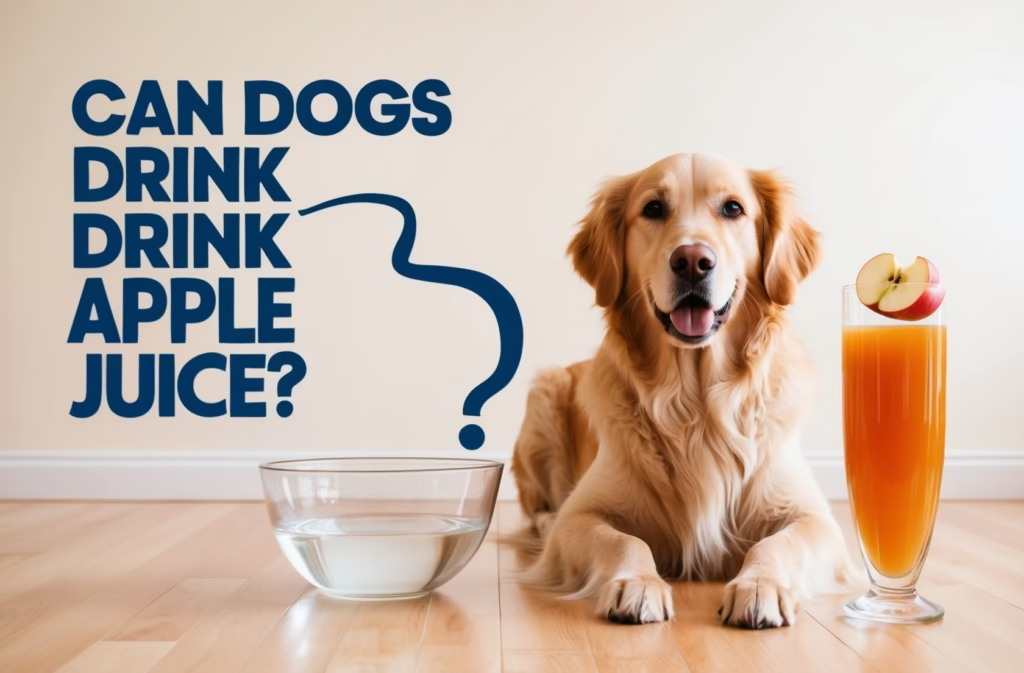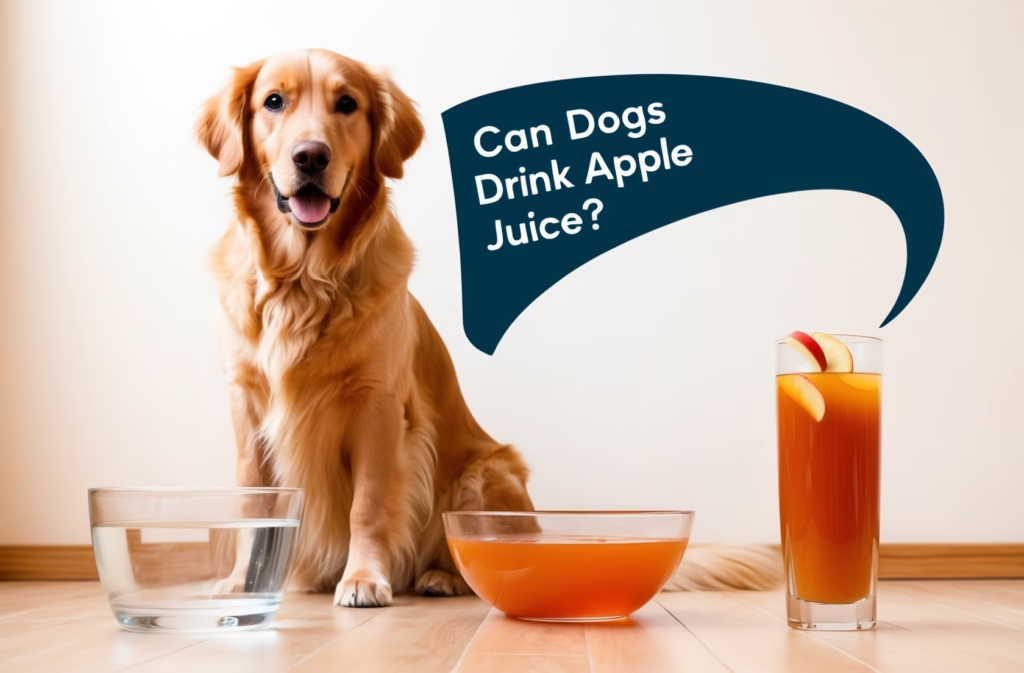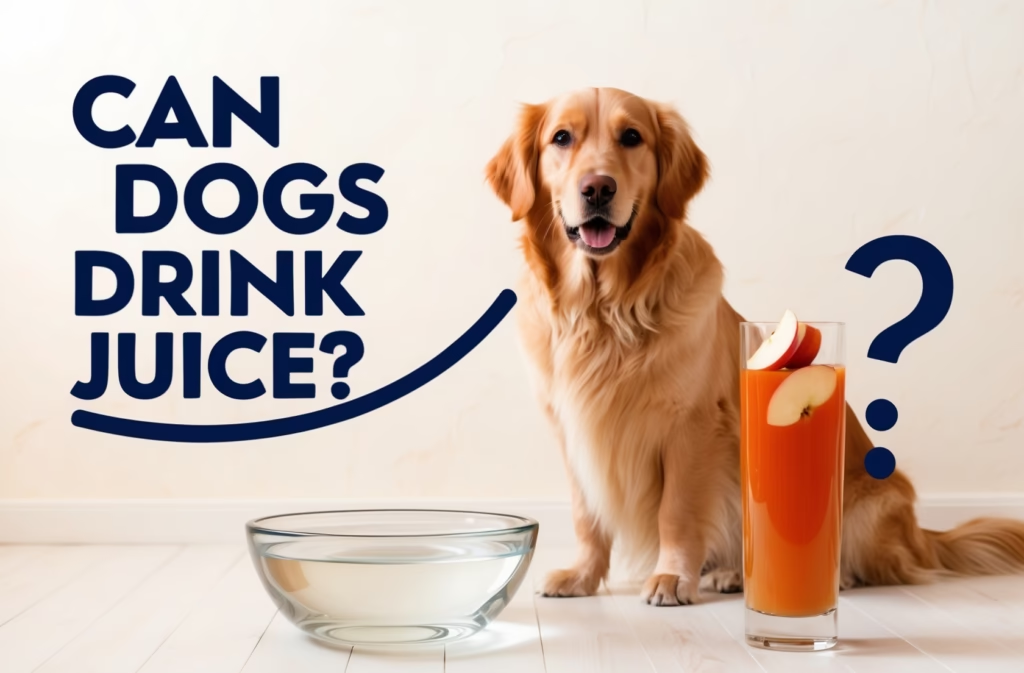Can Dogs Drink Apple Juice? Find out if apple juice is bad for dogs and learn the truth about apple juice dogs. Discover expert advice and keep your furry friend safe! Read now!
Can Dogs Drink Apple Juice? A Comprehensive Guide
The question, Can dogs drink apple juice? is a common one among dog owners. While the scent and sweetness of apple juice might tempt you to share a sip with your furry friend, the truth is a bit more nuanced. This detailed guide will explore the safety and potential risks associated with giving your dog apple juice, helping you make an informed decision about this popular beverage.
Understanding the Risks: Is Apple Juice Bad for Dogs?
The short answer is: it’s best to avoid giving your dog apple juice regularly, or in large quantities. While a tiny amount of 100% pure, unsweetened apple juice might not cause immediate harm, several factors contribute to its potential negative effects.
Firstly, apple juice dogs consume often contains high levels of sugar. Excessive sugar intake can lead to weight gain, obesity, and related health problems like diabetes in dogs. This is especially true for commercial apple juices which often contain added sugars, artificial sweeteners, and preservatives that are harmful to your canine companion.
Secondly, the acidity of apple juice, even natural varieties, can upset your dog’s stomach, causing diarrhea, vomiting, or other digestive issues. This is especially true if your dog has a sensitive stomach or pre-existing digestive problems. The high fructose content in apple juice can also be problematic for certain dogs.
Finally, many commercially available apple juices contain artificial colors, flavors, and preservatives, all of which are toxic to dogs. These chemicals can lead to a range of health issues, from mild discomfort to severe organ damage. Always prioritize choosing natural, unsweetened options if you are considering introducing apple juice into your dog’s diet, and only then in tiny quantities as an occasional treat.
The Benefits (If Any): Examining the Potential Upsides
While the risks outweigh the benefits, there are some minor potential upsides to consider. Apple juice, in its purest form, contains small amounts of vitamins and antioxidants. However, the quantities are negligible compared to what your dog can receive from a balanced diet of dog food and treats.
Instead of relying on apple juice for these nutrients, consider providing your dog with a healthy diet and other natural sources. A nutritious diet for your dog might even include small amounts of apples themselves, without added sugars or preservatives of any apple juices.
Exploring Healthier Alternatives: Apple-Infused Treats and Recipes
If you’re looking for ways to incorporate apples into your dog’s diet safely, consider incorporating small pieces of fresh apple into their meals or offering homemade treats that include apples. Always remove the core and seeds before giving any apple to your dog as they contain cyanide compounds.
For those interested in juice blends, you could explore options such as a homemade apple-carrot juice (check out this great recipe for apple carrot juice 7 surprising benefits: https://dishes-recipes.com/blog/apple-carrot-juice-7-surprising-benefits/). Remember, even with homemade blends, moderation is key. Also, always avoid adding honey or other sweeteners.
Here are some other healthy juice alternatives that incorporate apples: A refreshing green apple juice (https://dishes-recipes.com/blog/green-apple-juice/), a tropical pineapple-apple juice (https://dishes-recipes.com/blog/pineapple-apple-juice/), or a tangy raspberry-apple juice (https://dishes-recipes.com/blog/raspberry-apple-juice/) –though you should always consult your vet before introducing new foods or drinks to your dog’s diet. You could also try a delicious and nutritious apple, cucumber and kale juice (https://dishes-recipes.com/blog/apple-cucumber-kale-juice/) for yourself!
Types of Apple Juice and Their Impact on Dogs
It is important to understand that not all apple juices are created equal when it comes to canine consumption. The type of apple juice, its processing, and added ingredients significantly impact its suitability for dogs.
Unsweetened, 100% apple juice is the least harmful option, but still not ideal. However, even this type contains significant levels of natural sugars and acids, which could lead to digestive upset. Commercially available apple juice brands often contain added sugars, artificial sweeteners (like xylitol – which is highly toxic to dogs!), artificial colors, and preservatives that pose serious health risks to your dog.
Always check the ingredients list carefully before considering offering any apple juice to your pet. The less processed and the less added ingredients, the safer it is, but ultimately avoiding it is your best bet.
When to Seek Veterinary Attention
If your dog ingests a large quantity of apple juice, especially a variety containing artificial sweeteners or preservatives, monitor them closely for any signs of distress. Look out for symptoms such as vomiting, diarrhea, lethargy, loss of appetite, or unusual behavior.
If you notice any of these symptoms, contact your veterinarian immediately. Prompt veterinary care can help prevent serious complications. Early intervention is crucial in such cases, and your vet will be able to assess the situation and provide appropriate treatment if needed.
Frequently Asked Questions (FAQs) about Apple Juice and Dogs
Q: Can puppies drink apple juice?
A: No, puppies are even more vulnerable to the negative effects of apple juice than adult dogs. Their digestive systems are more sensitive, and they are more susceptible to the effects of sugar and acids.
Q: Is organic apple juice safer for dogs?
A: While organic apple juice might contain fewer pesticides and artificial additives, it is still high in sugar and acids, making it potentially harmful to your dog.
Q: Can I give my dog a small amount of apple juice as a treat?
A: While a tiny amount might not cause immediate harm, it’s generally not recommended. The risks associated with even small amounts outweigh any potential benefits.
Further Research and Expert Opinions
For a more in-depth understanding of dog nutrition and safe food choices, we recommend exploring resources from reputable veterinary organizations. The American Society for the Prevention of Cruelty to Animals (ASPCA) (https://www.aspca.org/) offers extensive information on pet care, including dietary recommendations. Similarly, the American Veterinary Medical Association (AVMA) (https://www.avma.org/) provides valuable resources on various aspects of canine health. Consulting these resources can help ensure you make informed decisions about your dog’s wellbeing.
Conclusion: Prioritize Your Dog’s Health
In conclusion, while the question of can dogs drink apple juice might seem simple, the answer is a cautious no unless it’s a tiny amount of pure, unsweetened juice on very rare occasions. The risks associated with sugar, acidity, and potential toxins in commercial apple juices far outweigh any minimal benefits. Always prioritize your dog’s health and safety by choosing safe, healthy alternatives for treats and snacks. Providing a balanced, nutritious diet and avoiding potentially harmful foods and drinks is the best way to ensure your canine companion remains happy and healthy.
Share Your Experiences!
Have you ever accidentally given your dog apple juice? What was your experience? Share your stories and insights in the comments below! Let’s learn from each other and create a community of informed and responsible dog owners. Use the keywords can dogs drink apple juice, apple juice dogs, or is apple juice bad for dogs in your comments to help other owners find helpful information!

- Can dogs drink apple juice?
- While a tiny amount of 100% apple juice (no added sugar or artificial sweeteners) is unlikely to harm most dogs, it’s generally not recommended. The sugar content can be problematic.
- Is apple juice bad for dogs?
- Yes, apple juice can be bad for dogs, primarily due to its high sugar content. Excessive sugar intake can lead to weight gain, diabetes, and dental problems in dogs. Is apple juice bad for dogs? The answer is mostly yes.
- Can apple juice dogs drink safely?
- No, apple juice isn’t considered safe for dogs to drink regularly. Even small amounts can contribute to negative health effects over time. Focus on providing water as their primary beverage.
- How much apple juice can a dog drink?
- It’s best to avoid giving your dog any apple juice. If accidentally ingested, a small amount is probably not a major concern, but it shouldn’t become a habit. Monitor your dog closely for any adverse reactions.
- What happens if a dog drinks apple juice?
- Depending on the amount consumed, a dog might experience digestive upset (diarrhea or vomiting), increased thirst, or weight gain. Large quantities can be more serious.
- Is it okay to give my dog a little bit of apple juice?
- While a tiny lick might not cause harm, it’s better to err on the side of caution. Water is the healthiest and safest beverage for your dog. Avoid introducing apple juice to your dog’s diet.
- Are there any benefits of apple juice for dogs?
- There are no significant benefits of apple juice for dogs that outweigh the risks associated with its high sugar content. Apples themselves contain some fiber and vitamins but are best given in small, controlled amounts as a treat.
- Apple juice dogs: safe or not?
- Not safe. Apple juice for dogs presents more risks than benefits. Stick to water and dog-specific treats.
- My dog drank apple juice, what should I do?
- Monitor your dog for any signs of illness such as vomiting, diarrhea, or lethargy. If you notice any unusual behavior, contact your veterinarian immediately.
- Can dogs drink apple juice from concentrate?
- No, apple juice from concentrate is even less suitable for dogs than regular apple juice due to added sugars and preservatives. It’s best to avoid this completely.

Can Dogs Drink Apple Juice? A Chef’s Guide to Canine-Friendly Apple Juice
The question, Can dogs drink apple juice? is a common one among pet owners. While the answer isn’t a simple yes or no, understanding the nuances of apple juice and its potential effects on your canine companion is crucial. This blog post will delve into the complexities of offering apple juice to dogs, exploring the potential benefits, risks, and ultimately, helping you make an informed decision.
Is Apple Juice Bad for Dogs? Understanding the Risks
The primary concern regarding apple juice dogs consume isn’t the apple itself, but rather the added sugars and other ingredients often found in commercially produced juices. Many brands contain high fructose corn syrup, artificial sweeteners, and preservatives, all of which can be detrimental to a dog’s health. Excessive sugar intake can lead to weight gain, diabetes, and dental problems. Artificial ingredients can trigger allergic reactions or digestive upset. Therefore, the simple answer to is apple juice bad for dogs? is: it depends on the type of apple juice.
Furthermore, the acidity of apple juice can upset a dog’s stomach, especially if given in large quantities. This can lead to vomiting, diarrhea, and other gastrointestinal issues. Always introduce any new food or drink to your dog gradually to monitor their reaction. For a more comprehensive look at other healthy juice options, consider exploring recipes for green apple juice, pineapple apple juice, or even raspberry apple juice, although these still need careful consideration for canine consumption.
Can Dogs Drink Apple Juice? The Case for Moderation
If you’re determined to offer your dog a small amount of apple juice, ensure it’s 100% pure, unsweetened apple juice with no added sugars or preservatives. Even then, moderation is key. A tiny amount, diluted with water, is acceptable occasionally, but it shouldn’t be a regular part of their diet. Think of it as an occasional treat, not a beverage replacement. Always consult with your veterinarian before introducing new foods or drinks into your dog’s diet, especially if they have pre-existing health conditions. For additional information on healthy dog diets, consider checking out resources like the American Kennel Club’s website AKC Dog Food Guide.
Alternatives to Apple Juice for Your Dog
Fresh water should always be the primary source of hydration for your dog. While a tiny amount of unsweetened apple juice might be acceptable occasionally, there are far healthier alternatives to quench their thirst. Consider offering them a healthy homemade treat like a apple cucumber kale juice (for human consumption, remember to keep it away from your furry friend). A better canine-friendly alternative would be plain water, broth (low-sodium), or even a small amount of unsweetened applesauce (made without added sugars) . Apple carrot juice also has a lot of benefits, but again, unsuitable for dogs due to high sugar content in commercial versions.
Nutritional Information of Homemade Unsweetened Apple Juice (1 cup serving)
Please note: this table represents approximate values and may vary based on the type of apple used. Since we strongly advise against giving dogs apple juice regularly, a detailed nutritional analysis is less relevant, but the following demonstrates the typical content of apple juice:
| Nutrient | Amount per Serving (1 cup) | % Daily Value (2,000 calorie diet) |
|---|---|---|
| Calories | 120 | 6% |
| Protein | 0g | 0% |
| Fat | 0g | 0% |
| Saturated Fat | 0g | 0% |
| Unsaturated Fat | 0g | 0% |
| Trans Fat | 0g | 0% |
| Carbohydrates | 30g | 10% |
| Sugar | 25g | N/A |
| Fiber | 2g | 8% |
| Vitamin C | 10mg | 11% |
| Potassium | 200mg | 4% |
| Other Vitamins and Minerals | Varying amounts | Varying percentages |
The high sugar content in even unsweetened apple juice, as illustrated above, highlights the importance of moderation or complete avoidance when considering offering this to your dog.
For further insights into dog nutrition, consult the FDA’s guidelines on pet food labeling.
Summary: Can Dogs Drink Apple Juice?
In conclusion, while a tiny amount of 100% pure, unsweetened apple juice might not be fatally harmful, it’s not recommended. The high sugar content and potential for digestive upset outweigh any minimal benefits. Fresh water is always the best option for your dog’s hydration needs. Stick to a balanced diet approved by your veterinarian, and always prioritize their health and well-being.
Call to Action
Have you ever experimented with giving your dog small amounts of apple juice? Share your experiences and tips in the comments below! Let’s create a community of informed pet owners. Don’t forget to share this post with other dog lovers on social media using #AppleJuiceDogs #DogHealth #CanineNutrition. Let’s help spread awareness and ensure our furry friends stay healthy and happy!

Can Dogs Drink Apple Juice? A Guide for Pet Owners
The short answer is: a tiny amount of plain, unsweetened apple juice is generally not harmful to dogs. However, it’s crucial to understand that generally doesn’t mean always safe. Giving your dog apple juice should be approached cautiously and with consideration for their individual health needs and the type of juice.
The primary concern with apple juice for dogs is the sugar content. Even natural fruit juices like those made from green apples (check out these green apple juice recipes), pineapple and apples (pineapple apple juice recipes), raspberry and apples (raspberry apple juice recipes), or combinations like apple, cucumber, and kale (apple, cucumber, and kale juice recipes) can contain significant amounts of sugar. Excessive sugar intake can lead to weight gain, dental problems, and even more serious health issues like diabetes in susceptible dogs. Furthermore, many commercially available apple juices contain added sugars, artificial sweeteners, and preservatives, all of which are harmful to your canine companion.
Another important factor is the acidity of apple juice. While not typically a major problem in small quantities, excessive consumption of acidic juices can upset a dog’s stomach, causing diarrhea or vomiting. Always opt for 100% juice with no added ingredients, and introduce it gradually and in very small amounts. Observe your dog closely for any adverse reactions.
If you’re looking for healthy juice options to supplement your dog’s diet, consider alternatives with lower sugar content. Some dog owners find success incorporating small amounts of diluted carrot and apple juice, which can offer some added nutritional benefits. Learn more about the benefits of apple and carrot juice for yourself! Remember, however, that fruits and vegetables should only constitute a small portion of a balanced canine diet. Always consult your veterinarian before making significant changes to your dog’s diet, particularly if they have pre-existing health conditions.
In summary, while a minuscule amount of plain, unsweetened apple juice is likely not to cause immediate harm, it’s best to avoid giving it to your dog altogether. Water is the best and safest beverage for your furry friend. If you’re looking to give your dog a healthy treat, offer them small pieces of apple (removing the core and seeds) instead. Always prioritize their health and well-being by consulting your vet with any dietary questions.